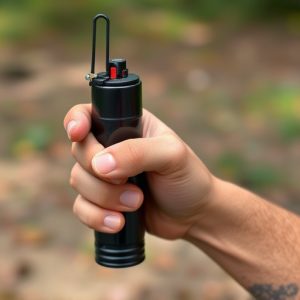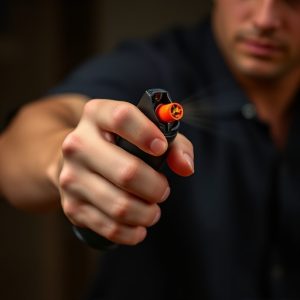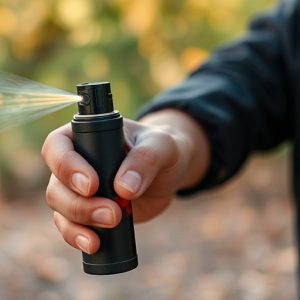Pepper Spray Management: Storage, Lifespan, Law, and Alternatives for Cops
Riot control agents like pepper spray are vital tools for law enforcement, requiring proper storage…….
Riot control agents like pepper spray are vital tools for law enforcement, requiring proper storage and consideration of their 2-5 year shelf life (as per manufacturer guidelines). Secure, cool, dry storage conditions, along with regular inventory checks and labeling, ensure potency and safety. Effective management of pepper spray's shelf life is crucial for maintaining its reliability in riot control, with appropriate non-lethal alternatives also available for diverse crowd management scenarios.
Riot control agents, such as pepper spray, are powerful tools in law enforcement, aiding in managing chaotic situations. This comprehensive guide delves into the intricacies of these non-lethal weapons, covering types, storage best practices (including pepper spray shelf life), legal use protocols, and exploring alternative crowd control solutions. Understanding these aspects is crucial for both officers and individuals seeking to navigate the complex landscape of riot control agent usage and safety.
- Understanding Riot Control Agents: Types and Their Role in Law Enforcement
- Pepper Spray Storage: Best Practices for Safe Keeping
- Shelf Life of Pepper Spray: What You Need to Know
- Legal Considerations: Regulations and Use Protocols
- Alternative Solutions: Exploring Non-Lethal Options for Crowd Control
Understanding Riot Control Agents: Types and Their Role in Law Enforcement
Riot control agents are a critical component in law enforcement’s arsenal, designed to manage and disperse large crowds or individuals during civil unrest, protests, or other high- tension situations. These agents, often referred to as less-lethal or non-deadly force tools, aim to temporarily incapacitate or cause discomfort without causing serious harm. The most common types include pepper spray, tear gas, and rubber bullets.
Pepper spray, a popular choice due to its effectiveness and relatively mild impact, is a chemical irritant that causes temporary blindness, coughing, and difficulty breathing. It comes in various forms, with different concentrations and shelf lives—a crucial consideration in law enforcement operations. Proper Pepper Spray Storage ensures agents remain effective, while understanding the product’s shelf life helps agencies plan and budget for regular replacement, ensuring their riot control capabilities remain robust.
Pepper Spray Storage: Best Practices for Safe Keeping
The proper storage of pepper spray is paramount for law enforcement agencies to ensure its effectiveness and safety. It should be kept in a secure, cool, dry place away from direct sunlight or extreme temperatures, as these conditions can degrade the chemical compound over time. Ideally, pepper spray should be stored on a high shelf or locked cabinet to prevent unauthorized access, with only trained personnel having access.
Furthermore, understanding the shelf life of pepper spray is crucial. While the lifespan varies depending on the manufacturer’s guidelines and storage conditions, most pepper sprays are effective for 2-5 years. Regular inventory checks and proper labeling are essential practices to track expiration dates and ensure the use of fresh, potent stocks when responding to incidents.
Shelf Life of Pepper Spray: What You Need to Know
The shelf life of pepper spray is a critical consideration for law enforcement agencies and individuals alike, as it directly impacts the effectiveness and reliability of this essential riot control agent. Pepper spray, when stored properly, can retain its potency for several years, but environmental factors play a significant role in determining its useful lifespan. Typically, well-stored pepper spray can remain effective for 2 to 3 years past the manufacturer’s recommended period, provided it is kept away from direct sunlight and extreme temperatures.
Proper storage involves keeping the container sealed and cool, often in a locked drawer or cabinet. Exposure to heat, moisture, and light can degrade the active ingredients, reducing the spray’s impact. It’s crucial for law enforcement units to maintain detailed records of their pepper spray inventory, including purchase dates and storage conditions, to ensure they are using the most potent and reliable equipment when faced with riot control situations.
Legal Considerations: Regulations and Use Protocols
In the realm of law enforcement, riot control agents like pepper spray are powerful tools, but their use is meticulously regulated to ensure public safety and protect officers from abuse. Legal considerations surrounding these agents encompass a wide range of issues, with regulations dictating Pepper Spray Storage and Shelf Life. Departments must adhere to strict protocols for proper storage, including secure locations away from unauthorized access, well-ventilated areas to prevent buildup, and clear labeling indicating contents and expiration dates.
Use protocols also mandate that officers undergo specialized training in the deployment of pepper spray, emphasizing minimal use and targeting specific body areas. The shelf life of pepper spray is a critical factor; regular inventory checks are essential to ensure agents remain effective within specified time frames. This careful management not only guarantees optimal performance but also safeguards against potential legal repercussions for excessive or inappropriate usage.
Alternative Solutions: Exploring Non-Lethal Options for Crowd Control
In recent years, law enforcement agencies have increasingly sought alternative solutions to riot control, focusing on non-lethal options for crowd management. These alternatives aim to minimize harm while still maintaining control during high-tension situations. One of the most commonly used tools is pepper spray, which has become a staple in many police forces’ arsenals. However, proper storage and awareness of its shelf life are crucial. Pepper spray has a limited lifespan, requiring regular maintenance and careful handling to ensure its effectiveness when needed.
Beyond pepper spray, various non-lethal weapons and tactics have emerged, such as less-lethal rounds, sting balls, water cannons, and noise makers. These tools offer a spectrum of crowd control capabilities, allowing officers to adapt their approach based on the specific circumstances. By employing these alternatives, law enforcement can de-escalate tensions, protect both citizens and officers, and maintain public safety without resorting to lethal force.
Riot control agents, particularly pepper spray, play a significant role in law enforcement for crowd management. By understanding the types, storage best practices (including key considerations around pepper spray storage and shelf life), legal protocols, and exploring alternative non-lethal solutions, law enforcement agencies can ensure their effective and safe use. This balanced approach allows for efficient crowd control while adhering to legal guidelines and public safety standards.


